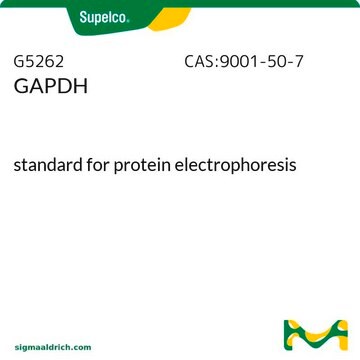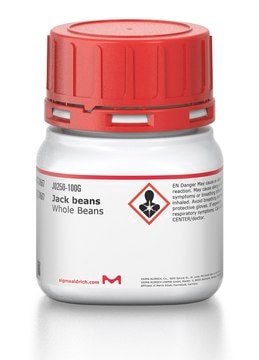14-1121
MultiDsk-Ubiquitin-binding protein reagent
This MultiDsk-Ubiquitin-binding protein reagent is validated for use in Affinity Precipitation Assays for the pull-down of mono- and poly-ubiquitinated proteins.
Synonyme(s) :
Dsk-Ubiquitin-binding protein reagent, Ubiquitin domain-containing protein DSK2
Se connecterpour consulter vos tarifs contractuels et ceux de votre entreprise/organisme
About This Item
Code UNSPSC :
12352203
eCl@ss :
32160702
Nomenclature NACRES :
NA.41
Produits recommandés
Description générale
MultiDsk - Ubiquitin-binding protein reagent is a GST fusion protein containing an array of five ubiquitin-associated (UBA) domains from the yeast Ub-binding protein Dsk2 (aa 327-373; UniProt P48510). MultiDsk binds and protects ubiquitinated proteins from deubiquitination. When immobilized on glutathione resins, MultiDsk can be used for affinity pull-down of mono- and poly-ubiquitinated proteins from cell extracts and tissue homogenates. This construct also contains a C-terminal 6xHis sequence and an internal 6xHis sequence between the N-terminal GST and the 5XUBA sequence (PMID 23056298). MultiDsk is expressed in and purified from Rosetta (DE3)pLysS strain of E. coli (Cat. No. 70956).
Product Source: Yeast protein, with a GST tag and a His tag, expressed in e. coli.
Spécificité
Mono- and poly-ubiquitinated proteins
Immunogène
Epitope: Ubiquitin
This is an protein reagent, not an antibody as it is a yeast protein, with a GST tag and a His tag, expressed in e. coli.
Application
Affinity Precipitation Assay Analysis: A representative lot of MultiDsk-Ubiquitin-binding protein was immobilized on agarose beads and used to precipitate ubiquitinated proteins from yeast and HEK293 whole cell extracts. (Wilson, D.M., et al. (2012) PLoS One. 7(10):e46398).
Affinity Precipitation Assay Analysis: A representative lot of MultiDsk-Ubiquitin-binding protein was immobilized on agarose beads and used to pull down ubiquitinated proteins from yeast whole cell extracts. (Wilson, D.M., et al. (2013) Cell. 154:983-995).
Affinity Precipitation Assay Analysis: A representative lot of MultiDsk-Ubiquitin-binding protein was immobilized on agarose beads and used to pull down ubiquitinated proteins from yeast whole cell extracts. (Wilson, D.M., et al. (2013) Cell. 154:983-995).
Qualité
Evaluated by Affinity Precipitation in yeast whole cell extract.
Affinity Precipitation Assay Analysis: Ubiquitinated proteins were isolated from 1.0 mg yeast whole cell extract by MultiDsk-Ubiquitin-binding protein reagent (7.8 ug to 31.3 ug MultiDsk per pull-down) immobilized on agarose beads
Affinity Precipitation Assay Analysis: Ubiquitinated proteins were isolated from 1.0 mg yeast whole cell extract by MultiDsk-Ubiquitin-binding protein reagent (7.8 ug to 31.3 ug MultiDsk per pull-down) immobilized on agarose beads
Forme physique
Format: Purified
Purified ubiquitin-binding protein in buffer containing 25mM Tris-HCl pH7.5, 150mM NaCl, 2mM β-mercaptoethanol with 50% glycerol without preservatives.
Stockage et stabilité
Stable for 1 year at -80°C from date of receipt.
Shipped on Dry Ice. Upon delivery aliquot and store at -80°C. Avoid freeze / thaw cycle
Shipped on Dry Ice. Upon delivery aliquot and store at -80°C. Avoid freeze / thaw cycle
Remarque sur l'analyse
Multiple bands observed.
Autres remarques
Concentration: Please refer to lot specific datasheet.
Code de la classe de stockage
10 - Combustible liquids
Classe de danger pour l'eau (WGK)
WGK 2
Point d'éclair (°F)
Not applicable
Point d'éclair (°C)
Not applicable
Certificats d'analyse (COA)
Recherchez un Certificats d'analyse (COA) en saisissant le numéro de lot du produit. Les numéros de lot figurent sur l'étiquette du produit après les mots "Lot" ou "Batch".
Déjà en possession de ce produit ?
Retrouvez la documentation relative aux produits que vous avez récemment achetés dans la Bibliothèque de documents.
Proteasome-mediated processing of Def1, a critical step in the cellular response to transcription stress.
Wilson, MD; Harreman, M; Taschner, M; Reid, J; Walker, J; Erdjument-Bromage, H; Tempst et al.
Cell null
MultiDsk: a ubiquitin-specific affinity resin.
Wilson, MD; Saponaro, M; Leidl, MA; Svejstrup, JQ
Testing null
Notre équipe de scientifiques dispose d'une expérience dans tous les secteurs de la recherche, notamment en sciences de la vie, science des matériaux, synthèse chimique, chromatographie, analyse et dans de nombreux autres domaines..
Contacter notre Service technique







